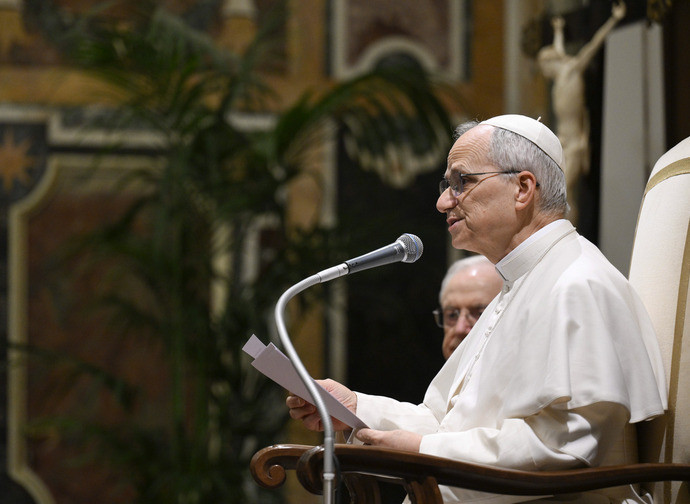Leo XIV and Social Doctrine: an uncertain path
The new Pope’s significant speech delivered on 17 May to the Centesimus Annus Foundation does not clarify whether it represents a “turning point” in the relaunch of Social Doctrine, or if we should expect a “reform in continuity” with Pope Francis.

Last Saturday, 17 May, Leo XIV gave a speech to the Vatican Foundation Centesimus Annus Pro Pontifice. This was his first detailed address on the social doctrine of the Church since his brief remarks from the loggia of St Peter's immediately after his election. These words raised hopes among many that the Church’s doctrinal heritage and experience would be relaunched. Last Saturday's speech provided the first systematic treatment of the Church's social doctrine, enabling us to cautiously confirm that hope.
When reading these initial speeches by Leo XIV, it comes naturally to seek out the 'novelties' compared to Francis's teachings. This is not a conditioned reflex or mere morbid curiosity. It is understandable given how the Church's social doctrine was virtually erased during the previous pontificate. Therefore, it is only natural to wonder whether Pope Leo is gradually steering the ship in a new direction, avoiding sudden changes, or whether he intends to maintain the status quo and proceed with his own 'reform in continuity'.
Firstly, the speech reaffirms the 'doctrinal' dimension of the Church's social doctrine. It is a doctrine in the sense of 'science, discipline, knowledge'. It is important to remember that it has often been understood as a practice. However, it is also subsequently seen as 'the fruit of research and therefore of hypotheses, voices, advances and failures, through which it seeks to transmit reliable, orderly and systematic knowledge', and thus it is traced back to a 'common, choral and even multidisciplinary journey'. John Paul II had already indicated multidisciplinarity in no. 59 of Centesimus Annus, and if it is properly defined, it is not a problem.
Nevertheless, this collaborative exploration of hypotheses, successes and failures reflects Francis's approach to a practice from which insights emerge along the way. On the other hand, the meaning of the word 'doctrine' indicates a deposit of truths that illuminate the path, which only at that point becomes a 'common and choral journey' and not before. 'Order' and 'systematicity' are already present at the beginning and do not arise from a process, even if trials and errors refine prudential attitudes over time. Does the proclamation of truth precede or follow walking together? Which of these two visions did Pope Leo intend to propose?
Regarding “doctrine”, he clarifies that the Church “does not seek to claim possession of the truth, either in analysing problems or in resolving them”. The Church does not provide technical solutions — this is an established tenet of social teaching. However, it is debatable whether the Church raises the banner of truth if it remains 'the proclamation of Christ', as John Paul II wrote. The social doctrine of the Church proposes principles of reflection and criteria of judgement as 'true', drawing from sound philosophy and the deposit of faith. Even when it has proposed 'guidelines for action' in the past, the Church has not intended to limit itself to providing operational advice for the moment, but rather to provide practical guidelines that can be applied even at a later date, as they contain truths alongside transitory aspects.
'In such matters,' continues Pope Leo, 'it is more important to know how to approach them than to give a hasty answer as to why something has happened or how to overcome it. The goal is to learn to deal with problems, which are always different because each generation is new, with new challenges, dreams and questions.' Knowledge of situations through the virtue of 'discretion' is beneficial, but this practical ability to approach situations does not take precedence over the theoretical approach according to truth; rather, it presupposes and follows it. In this speech, Pope Leo himself says that social doctrine ‘with its own anthropological perspective seeks to promote genuine access to social issues’, meaning that access to situations does not precede the gaze of truth, but follows it if it is to be ‘true’ access.
Pope Leo is right to say that social doctrine wants to nourish ‘dialogue’, and he is also right to point out that ‘without doctrine, dialogue is empty’. However, the distinction between doctrine and indoctrination that follows from this reasoning seems to pay tribute to Francis by both recovering his concept of proselytism and recalling his criticism of those who ‘hurl doctrinal formulas and truths like stones’. If by indoctrination we mean adequate formation, it cannot be described as 'immoral', as stated in the speech under review. It is a matter of understanding each other.
Whether we are witnessing a 'turning point' in the revival of the Church's social doctrine with Pope Leo XIV or a 'reform in continuity' with Pope Francis remains to be seen. Last Saturday's speech presents a mixture of elements from both possible visions. We await the next opportunity.
Leo XIV's election is a defeat for the 'Chinese party'
Leo XIV was immediately portrayed by the mainstream narrative as anti-Trump, 'the least American of the American cardinals'. But this is an unrealistic version of events, because his election must be seen in contrast to the defeat of the 'Chinese party' in the Church, which sought a preferential relationship with the Beijing regime.
Leo XIV introduces himself: the return of evangelisation and verticality
From the first words spoken by Pope Prevost on Saint Peter’s balcony, verticality and evangelisation emerge as the proclamation of Christ and popular Marian devotion. With some concessions to the process of synodality, a legacy of the previous pontificate.
